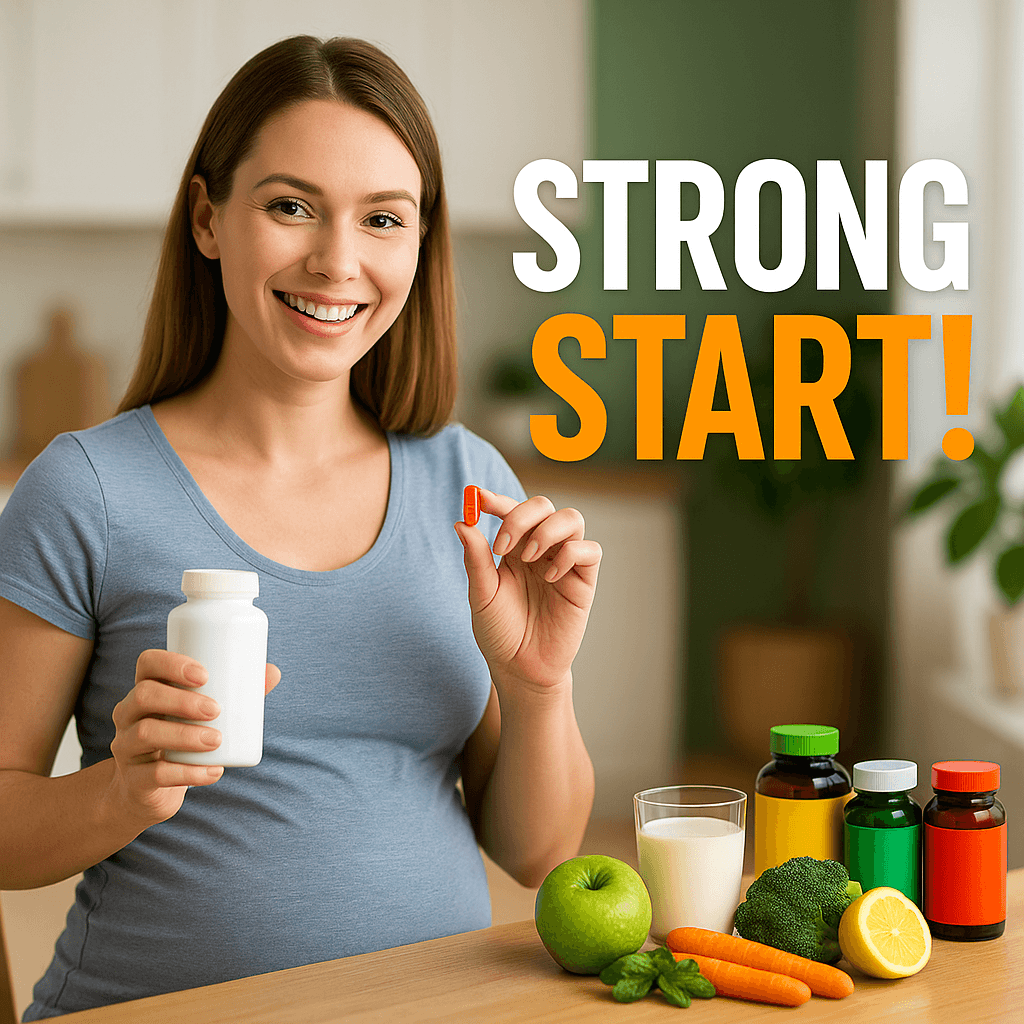Introduction
Starting a healthy pregnancy journey begins with the right nutritional foundation. During pregnancy, your body’s nutritional demands increase significantly to support both your health and your baby’s development. While a balanced diet forms the cornerstone of good prenatal nutrition, prenatal vitamins serve as crucial insurance against potential nutrient gaps that could impact your pregnancy outcomes.
The prenatal vitamin market can feel overwhelming, with countless brands promising optimal support for you and your growing baby. Many expectant mothers find themselves paralyzed by choice, unsure which supplement will truly deliver the nutrients they need. This comprehensive guide cuts through the confusion by presenting seven simple, evidence-based prenatal vitamin choices that provide strong nutritional support throughout your pregnancy journey.
Each option we’ll explore has been selected based on nutrient quality, absorption rates, safety profiles, and real-world feedback from healthcare providers and mothers. Whether you’re planning to conceive, currently pregnant, or breastfeeding, these carefully chosen prenatal vitamins offer reliable pathways to better maternal and fetal health outcomes.
Understanding Prenatal Vitamins Fundamentals
What Makes Prenatal Vitamins Different
Prenatal vitamins differ significantly from standard multivitamins in their formulation and nutrient concentrations. These specialized supplements contain higher levels of specific nutrients crucial during pregnancy, including folic acid, iron, and calcium. Regular multivitamins typically don’t provide adequate amounts of these pregnancy-essential nutrients.
The formulation of prenatal vitamins reflects the increased nutritional demands during pregnancy. For instance, folic acid needs nearly double during pregnancy to prevent neural tube defects, while iron requirements increase by approximately 50% to support expanded blood volume and fetal development.
When to Start Taking Prenatal Vitamins
Healthcare providers recommend beginning prenatal vitamins at least one month before conception when possible. This timing ensures optimal nutrient levels during the critical early weeks of fetal development, particularly for neural tube formation. Many women don’t realize they’re pregnant until several weeks after conception, making pre-conception supplementation particularly important.
If you’re already pregnant and haven’t started prenatal vitamins, begin immediately. The benefits of prenatal supplementation continue throughout pregnancy and extend into breastfeeding, supporting both maternal recovery and infant nutrition through breast milk.
Key Nutrients for Pregnancy Support
Quality prenatal vitamins should contain specific nutrients in appropriate amounts. Folic acid prevents birth defects, iron supports increased blood volume, calcium builds fetal bones and teeth, and vitamin D enhances calcium absorption. Additionally, omega-3 fatty acids, particularly DHA, support brain and eye development.
Understanding these fundamental differences helps you make informed decisions about prenatal vitamin selection. The right prenatal vitamins provide targeted nutritional support that generic supplements simply cannot match during this critical life stage.
The 7 Simple Prenatal Vitamin Choices
Choice 1: Rainbow Light Prenatal One Multivitamin
Rainbow Light Prenatal One stands out as a premium complete formula that delivers comprehensive nutritional support in a single daily tablet. This prenatal vitamin contains 800 mcg of folate, 27 mg of iron, and 150 mg of calcium, meeting or exceeding most pregnancy nutritional requirements.
The formula includes gentle herbs like ginger and spirulina that may help reduce morning sickness symptoms. Third-party testing ensures purity and potency, while the food-based nutrients enhance absorption and reduce stomach upset compared to synthetic alternatives.
Pros: Complete nutrition profile, gentle on the stomach, organic ingredients.
Cons: Higher price point, large tablet size may be difficult for some women
Choice 2: Nature Made Prenatal Multi + DHA
For budget-conscious expectant mothers, Nature Made Prenatal Multi + DHA provides essential nutrients without compromising quality. This prenatal vitamin offers 600 mcg of folic acid, 28 mg of iron, and 150 mg of DHA in an affordable package that doesn’t strain your budget.
USP verification guarantees that these prenatal vitamins meet strict quality standards for purity, potency, and disintegration. The combination pack includes both prenatal multivitamin tablets and DHA softgels, ensuring comprehensive nutritional coverage.
Pros: Affordable pricing, USP verified, widely available.
Cons: Requires taking two separate pills, synthetic nutrients
Choice 3: Pink Stork Total Prenatal Vitamins
Pink Stork Total addresses the common concern of prenatal vitamins causing nausea and digestive discomfort. These prenatal vitamins feature a gentle, plant-based formula that’s easier on sensitive stomachs while still providing comprehensive nutritional support.
The formula includes 600 mcg of folate (as methylfolate for better absorption), organic herbs, and probiotics to support digestive health. Many women find these prenatal vitamins more tolerable during early pregnancy when morning sickness is most severe.
Pros: Gentle on the stomach, includes probiotics, methylfolate form.
Cons: Lower iron content may require additional supplementation
Choice 4: Garden of Life Vitamin Code Raw Prenatal
Garden of Life offers an organic, whole-food-based prenatal vitamin option for women prioritizing natural ingredients. These prenatal vitamins provide nutrients in their raw, uncooked form with live probiotics and enzymes to enhance absorption and digestive comfort.
The formula contains 800 mcg of folate from organic sources, 18 mg of iron, and a comprehensive blend of vitamins and minerals derived from whole foods rather than synthetic sources.
Pros: Organic whole-food sources, includes probiotics and enzymes, vegetarian.
Cons: Multiple capsules required, higher cost, lower iron content
Choice 5: SmartyPants Prenatal Complete Gummy Vitamins
For women who struggle with swallowing pills, SmartyPants Prenatal Complete offers a palatable gummy alternative. These prenatal vitamins provide essential nutrients in a delicious, chewable format that makes daily supplementation more enjoyable.
Each serving contains 600 mcg of folate, omega-3 DHA and EPA, vitamin D, and vitamin B12. The gummy format eliminates the pill-swallowing challenge while maintaining nutritional integrity through careful formulation.
Pros: Easy to take, pleasant taste, contains omega-3s.
Cons: No iron (requires separate supplement), contains sugar, multiple gummies needed
Choice 6: Thorne Basic Prenatal
Thorne Basic Prenatal caters to women with iron sensitivity or those whose healthcare providers recommend iron-free prenatal vitamins. This high-quality supplement provides comprehensive nutrition without iron, allowing for separate iron supplementation as needed.
The formula includes active folate (5-MTHF), well-absorbed mineral forms, and optimal vitamin D levels. NSF certification ensures pharmaceutical-grade quality and purity standards that exceed typical supplement requirements.
Pros: High-quality ingredients, active nutrient forms, no iron.
Cons: Requires separate iron supplement, higher price point, prescription-like cost
Choice 7: Deva Vegan Prenatal Multivitamin
Deva Vegan Prenatal addresses the unique nutritional needs of plant-based expectant mothers. These prenatal vitamins provide vegan-friendly sources of typically animal-derived nutrients like vitamin B12 and vitamin D3.
The formula contains 800 mcg of folic acid, 28 mg of iron from plant sources, and comprehensive vitamin and mineral support tailored for vegan lifestyles. All ingredients are certified vegan and free from animal-derived components.
Pros: Vegan-certified, comprehensive nutrition, affordable.
Cons: Large tablet size, synthetic nutrients, may need additional DHA supplement
Essential Nutrients Breakdown
Folic Acid for Neural Tube Development
Folic acid represents perhaps the most critical nutrient in prenatal vitamins, preventing serious birth defects of the brain and spine called neural tube defects. The CDC recommends 400 mcg daily for women of reproductive age, increasing to 600 mcg during pregnancy.
Prenatal vitamins should contain at least 400 mcg of folic acid, though many provide 600-800 mcg to ensure adequate levels. Some women benefit from methylfolate, the active form of folate that bypasses genetic variations affecting folate metabolism.
Iron for Blood Volume Expansion
Iron needs increase dramatically during pregnancy to support expanded blood volume and prevent iron deficiency anemia. Prenatal vitamins typically contain 18-30 mg of iron, compared to 8-18 mg in regular multivitamins.
Iron deficiency during pregnancy can lead to premature birth, low birth weight, and maternal complications. However, iron can cause constipation and nausea, making the form and amount in prenatal vitamins particularly important for tolerability.
Calcium and Vitamin D for Bone Health
Calcium supports fetal bone and tooth development while maintaining maternal bone density. Prenatal vitamins often contain 150-300 mg of calcium, though pregnant women need 1,000 mg daily, requiring additional dietary sources or separate supplementation.
Vitamin D enhances calcium absorption and supports immune function. Most prenatal vitamins provide 400-1,000 IU of vitamin D, though some women may require higher amounts based on blood testing and geographic location.
DHA for Brain Development
Docosahexaenoic acid (DHA), an omega-3 fatty acid, supports fetal brain and eye development. Many prenatal vitamins now include DHA, though amounts vary significantly between products. The recommended intake is 200-300 mg daily during pregnancy.
Some prenatal vitamins require separate DHA supplements to meet optimal intake levels. Fish-derived DHA is most common, though algae-based options exist for vegetarians and vegans.
Making Your Choice Simple
Quick Decision Framework
Selecting the right prenatal vitamins doesn’t need to be complicated. Start by identifying your specific needs: Do you have trouble swallowing pills? Are you a vegetarian or vegan? Do you have iron sensitivity? Do you prefer organic ingredients?
Next, verify that your chosen prenatal vitamins contain adequate amounts of key nutrients: at least 400 mcg folic acid, 18-30 mg iron (unless contraindicated), and some calcium and vitamin D. Look for third-party testing or USP verification for quality assurance.
Consider your budget and accessibility. The best prenatal vitamins are the ones you’ll take consistently throughout pregnancy. Sometimes, a moderately priced option you can afford long-term serves you better than an expensive supplement you’ll discontinue.
Red Flags to Avoid
Avoid prenatal vitamins with megadoses of fat-soluble vitamins (A, D, E, K), which can accumulate to toxic levels. Be wary of products making unrealistic claims or lacking proper labeling with ingredient amounts and sources.
Skip prenatal vitamins from unknown manufacturers or those sold through questionable channels. Quality prenatal vitamins should be available through reputable retailers, pharmacies, or healthcare providers.
Avoid products with unnecessary additives, fillers, or artificial colors that don’t contribute to nutritional value. Simple, clean formulations often work better than complex blends with dozens of ingredients.
When to Consult Your Doctor
Always discuss prenatal vitamin choices with your healthcare provider, especially if you have pre-existing medical conditions, take medications, or have had previous pregnancy complications. Some women require prescription prenatal vitamins with higher nutrient levels.
If you experience persistent side effects like severe nausea, constipation, or allergic reactions, consult your doctor about alternative options. Your healthcare provider may recommend different forms, dosages, or timing strategies.
Women with specific dietary restrictions, multiple pregnancies, or certain genetic variations may need customized prenatal vitamin regimens that go beyond standard over-the-counter options.
Conclusion
Choosing prenatal vitamins doesn’t have to be overwhelming when you focus on these seven simple, proven options. Each choice offers reliable nutritional support for your pregnancy journey, whether you prioritize budget-friendliness, organic ingredients, gentle formulations, or specific dietary needs.
The most important step is starting prenatal vitamins and taking them consistently throughout pregnancy and breastfeeding. These carefully selected options provide strong foundations for both maternal health and fetal development, giving you confidence in your nutritional choices.
Remember that prenatal vitamins supplement, not replace, a healthy diet. Combine your chosen prenatal vitamins with nutritious foods, regular prenatal care, and open communication with your healthcare provider for the strongest possible start to parenthood.
Take action today by selecting the prenatal vitamin option that best fits your needs and circumstances. Your future self and your baby will benefit from this simple yet powerful investment in optimal pregnancy nutrition.




